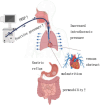The intricate interactions between the lungs and gut in patients: unraveling the crosstalk mechanism
- PMID: 40809439
- PMCID: PMC12343513
- DOI: 10.3389/fmed.2025.1624907
The intricate interactions between the lungs and gut in patients: unraveling the crosstalk mechanism
Abstract
There is a growing body of evidence indicating that the stimulation of one organ can significantly influence the functioning of another. For instance, intestinal complications are frequently observed during respiratory diseases, and conversely, pulmonary complications can arise during intestinal diseases-a phenomenon referred to as lung-gut crosstalk. Patients suffering from mechanical ventilator-induced lung injury, chronic obstructive pulmonary disease (COPD), acute respiratory distress syndrome (ARDS), and other pulmonary conditions have been shown to experience gastrointestinal dysfunction and related disorders. Similarly, individuals with inflammatory bowel disease (IBD) have also been found to develop pulmonary complications. However, these studies are not enough to fully explain the mechanism of lung-intestinal crosstalk, and more potential mechanisms need to be explored and further elucidated. In this paper, we summarize recent research advancements regarding lung-intestinal interactions in the context of pulmonary and intestinal diseases, analyzing the potential mechanisms of lung-intestinal crosstalk from the perspectives of respiratory mechanics, inflammation, and microbiota. Additionally, we review evidence suggesting that adipokines may play a role in lung-gut interactions, and we propose new avenues for investigating the mechanisms underlying these interactions.
Keywords: adipokines; immunity; inflammatory bowel disease; lung-gut crosstalk; microbiome; ventilator-induced lung injury.
Copyright © 2025 Li, Chen and Hu.
Conflict of interest statement
The authors declare that the research was conducted in the absence of any commercial or financial relationships that could be construed as a potential conflict of interest.
Figures
References
-
- Turner-Warwick M. Fibrosing alveolitis and chronic liver disease. Q J Med. (1968) 37:133–49. - PubMed
Publication types
LinkOut - more resources
Full Text Sources




